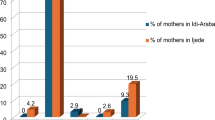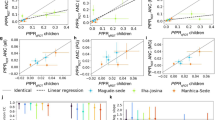Abstract
Background
Malaria during pregnancy can have adverse effects on fetal development, but its impact on neurodevelopment remains unclear. Although some studies have explored the consequences of prenatal malaria, gaps persist due to inconsistencies in exposure timing, assessment methods, and study designs.
Methods
This systematic review highlighted the gaps in six studies selected from an initial pool of 2029 articles, offering clearer insights into the neurodevelopmental outcomes of prenatal malaria exposure.
Results
Studies from Uganda, Benin, Ghana, and Malawi show that malaria during pregnancy adversely impacts cognitive, motor, and behavioral development. Cognitive deficits were observed at 12 and 24 months, with some studies indicating long-term effects at 36 months. Motor development and language outcomes were variable, with language impairments linked to malaria acquired late in pregnancy.
Conclusions
The review identifies gaps in research, such as the role of asymptomatic infections, exposure timing, and malaria’s interaction with maternal comorbidities like HIV. Potential mechanisms for neurodevelopmental deficits include placental dysfunction and inflammation impacting fetal brain development. However, methodological limitations, such as varying assessment tools and sample sizes, prevent conclusive evidence. The review calls for more longitudinal studies to understand the long-term effects of prenatal malaria better and guide interventions to improve child development in malaria-endemic regions.
Impact
-
Prenatal malaria exposure is linked to cognitive deficits, with potential long-term effects on motor and language development.
-
Late pregnancy malaria may have a stronger impact on language development, highlighting the importance of exposure timing.
-
Mechanisms such as placental dysfunction and inflammation may disrupt fetal brain development and contribute to neurodevelopmental deficits.
-
Future studies should prioritize longitudinal research using advanced methodologies to better understand the long-term effects of prenatal malaria exposure on neurodevelopment.
This is a preview of subscription content, access via your institution
Access options
Subscribe to this journal
Receive 14 print issues and online access
$259.00 per year
only $18.50 per issue
Buy this article
- Purchase on SpringerLink
- Instant access to full article PDF
Prices may be subject to local taxes which are calculated during checkout

Similar content being viewed by others
References
World Health Organization (WHO), Geneva, Switzerland. World malaria report. https://www.who.int/teams/global-malaria-programme/reports/world-malaria-report-2023 (2023).
Weckman, A. M. et al. Neurocognitive outcomes in Malawian children exposed to malaria during pregnancy: An observational birth cohort study. PLOS Med. 18, e1003701 (2021).
Rogerson, S. J., Mwapasa, V. & Meshnick, S. R. Malaria in Pregnancy: Linking Immunity and Pathogenesis to Prevention. In: Defining and Defeating the Intolerable Burden of Malaria III: Progress and Perspectives: Supplement to Volume 77(6) of American Journal of Tropical Medicine and Hygiene (American Society of Tropical Medicine and Hygiene, 2007).
World Health Organization (WHO), Geneva, Switzerland. World malaria report. https://www.who.int/publications-detail-redirect/9789240040496 (2021).
Edelson, P. K. et al. Maternal anemia is associated with adverse maternal and neonatal outcomes in Mbarara, Uganda. J. Matern. Fetal Neonatal Med. 36, 2190834 (2023).
Mishra, S. K. & Newton, C. R. J. C. Diagnosis and management of the neurological complications of falciparum malaria. Nat. Rev. Neurol. 5, 189–198 (2009).
Black, M. M. et al. Early childhood development coming of age: science through the life course. Lancet Lond. Engl. 389, 77–90 (2017).
Take Action for the Sustainable Development Goals. United Nations Sustainable Development https://www.un.org/sustainabledevelopment/sustainable-development-goals/ (2025).
Conroy, A. L. et al. Case Report: Birth Outcome and Neurodevelopment in Placental Malaria Discordant Twins. https://doi.org/10.4269/ajtmh.18-0659 (2019).
Wells, G. A. et al. The Newcastle-Ottawa Scale (NOS) for assessing the quality of nonrandomised studies in meta-analyses. https://www.ohri.ca/programs/clinical_epidemiology/oxford.asp (2021).
Murad, M. H., Sultan, S., Haffar, S. & Bazerbachi, F. Methodological quality and synthesis of case series and case reports. BMJ Evid. Based Med. 23, 60–63 (2018).
Garrison, A. et al. The Effects of Malaria in Pregnancy on Neurocognitive Development in Children at 1 and 6 Years of Age in Benin: A Prospective Mother-Child Cohort. Clin. Infect. Dis. 74, 766–775 (2022).
Bangirana, P. et al. Effect of Malaria and Malaria Chemoprevention Regimens in Pregnancy and Childhood on Neurodevelopmental and Behavioral Outcomes in Children at 12, 24, and 36 Months: A Randomized Clinical Trial. Clin. Infect. Dis. 76, 600 (2022).
Lawford, H. L. S. et al. Associations between malaria in pregnancy and neonatal neurological outcomes. Int. J. Infect. Dis. 112, 144–151 (2021).
Cutts, J. C. et al. Pregnancy-specific malarial immunity and risk of malaria in pregnancy and adverse birth outcomes: a systematic review. BMC Med 18, 14 (2020).
Das, J. K. et al. Malaria in pregnancy: Meta-analyses of prevalence and associated complications. Epidemiol. Infect. 152, e39 (2024).
Chua, C. L. L., Hasang, W., Rogerson, S. J. & Teo, A. Poor Birth Outcomes in Malaria in Pregnancy: Recent Insights Into Mechanisms and Prevention Approaches. Front. Immunol. 12, 621382 (2021).
Ngai, M. et al. Malaria in Pregnancy and Adverse Birth Outcomes: New Mechanisms and Therapeutic Opportunities. Trends Parasitol. 36, 127–137 (2020).
McDonald, C. R., Elphinstone, R. E. & Kain, K. C. The impact of placental malaria on neurodevelopment of exposed infants: a role for the complement system? Trends Parasitol. 29, 213–219 (2013).
McDonald, C. R. et al. Experimental Malaria in Pregnancy Induces Neurocognitive Injury in Uninfected Offspring via a C5a-C5a Receptor Dependent Pathway. PLoS Pathog. 11, e1005140 (2015).
Regal, J. F., Gilbert, J. S. & Burwick, R. M. The complement system and adverse pregnancy outcomes. Mol. Immunol. 67, 56–70 (2015).
Lawford, H. L. S., Lee, A. C., Kumar, S., Liley, H. G. & Bora, S. Establishing a conceptual framework of the impact of placental malaria on infant neurodevelopment. Int. J. Infect. Dis. 84, 54–65 (2019).
Dombrowski, J. G. et al. Association of Malaria Infection During Pregnancy With Head Circumference of Newborns in the Brazilian Amazon. JAMA Netw. Open 2, e193300 (2019).
Urakubo, A., Jarskog, L. F., Lieberman, J. A. & Gilmore, J. H. Prenatal exposure to maternal infection alters cytokine expression in the placenta, amniotic fluid, and fetal brain. Schizophr. Res. 47, 27–36 (2001).
Katus, L. et al. Implementing neuroimaging and eye tracking methods to assess neurocognitive development of young infants in low- and middle-income countries. Gates Open Res. 3, 1113 (2019).
Acknowledgements
The authors would like to express their gratitude to the Indian Council of Medical Research - National Institute of Malaria Research (ICMR-NIMR), Government of India, for their institutional support.
Author information
Authors and Affiliations
Contributions
S.N., N.N. contributed to the conceptualization and design of the systematic review. S.N., N.N. led the literature search, data extraction, and analysis, and drafted the initial manuscript. S.N., R.S., N.N. conducted the screening of articles, assessed study quality, and contributed to the synthesis of findings and manuscript revisions. S.N., N.N., P.K.B. critically reviewed the manuscript, and contributed to the final revisions. R.S. assisted with statistical analysis, interpretation of results. All authors approved the final version of the manuscript.
Corresponding author
Ethics declarations
Competing interests
The authors declare no competing interests.
Additional information
Publisher’s note Springer Nature remains neutral with regard to jurisdictional claims in published maps and institutional affiliations.
Supplementary information
Rights and permissions
Springer Nature or its licensor (e.g. a society or other partner) holds exclusive rights to this article under a publishing agreement with the author(s) or other rightsholder(s); author self-archiving of the accepted manuscript version of this article is solely governed by the terms of such publishing agreement and applicable law.
About this article
Cite this article
Nema, S., Singhal, R., Bharti, P.K. et al. Malaria in pregnancy and its potential impact on neurodevelopment in children: a systematic review. Pediatr Res (2025). https://doi.org/10.1038/s41390-025-03967-5
Received:
Revised:
Accepted:
Published:
DOI: https://doi.org/10.1038/s41390-025-03967-5



